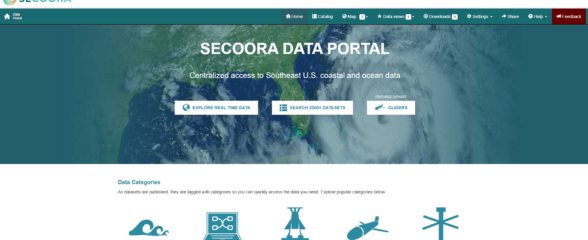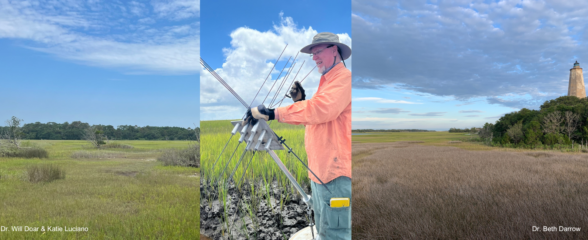October 26-28, 2015, partners convened a workshop in St. Petersburg, Florida to advance our understanding of the impacts of climate variability on fisheries resources and management in the large marine ecosystems of the Gulf of Mexico, South Atlantic and Caribbean Sea. More than 55 experts from fishery management councils, federal and state fisheries and climate entities, academia and private industry attended the “Climate Variability and Fisheries Workshop: Setting Research Priorities for the Gulf of Mexico, South Atlantic, and Caribbean Regions.” The purpose of the workshop was to identify research and monitoring needs regarding climate variability and its potential impact on fisheries resources and management. Click to access the Executive Summary and meeting materials.
During the three-day workshop, attendees worked collaboratively to:
- Share the state-of-the-science and examples of apparent climate change and its potential impacts on fisheries resources (including protected resources such as marine mammals, turtles, and corals) in each region.
- Discuss how climate variability may impact fish distribution, catch, socioeconomics, and management.
- Identify and prioritize research and monitoring needs related to climate variability and fisheries for each region.
- Consider needs common to all regions, and discuss strategies for applied, collaborative research across geographies and disciplines.
- Learn from others working on the links between fisheries and climate in other regions.
- Identify opportunities for addressing priority needs.
Through a series of facilitated plenary and breakout discussions, participants considered regional and cross-regional impacts of environmental change on fisheries. Attendees were placed into four cross-regional and cross-disciplinary breakout groups. Each workshop attendee was assigned to a breakout group to ensure each group included an even distribution of disciplines and regional representation. The participants identified their own region and discipline (either Fisheries Scientist; Fisheries Manager (includes policy); Oceanographer (biological or physical); Climate Scientist; Industry; Socio-economic; or other). These four breakout groups met three times to identify both research and monitoring/observing needs, and discussed the specific questions related to fish populations and fisheries.
Pictured above is Debra Hernandez, SECOORA Executive Director, facilitating a breakout session. Credit: SECOORA
After each breakout discussion, attendees in their group were asked to vote for their top research priorities and top observation priorities for the next 1 to 3 years. The three needs with the most number of votes were considered “top priority”. To get a prioritized list of overall research and monitoring needs in regards to 1) Fish Populations, 2) Fisheries and 3) Fisheries Management a survey was distributed that combined the research and monitoring needs. Below are the top overall priorities identified:
Cross-Regional Breakout Priorities
| Breakout 1: Research and Monitoring/Observing Needs to Track, Understand and Project Climate-related Changes in Fish Populations | |
| Topic | Given that fish populations (including all marine resources and habitat) are going to respond to climate variability and change, what is the critical information we need to address climate-related impacts related to productivity, recruitment, migration, behavior and physiology, as well as spatio-temporal changes? |
| Research Top Priority | Research on climate/environmental related vulnerabilities/thresholds/tolerances/impacts on all aspects of fish life history (phenology) and habitat. |
| Monitoring/ Observing Top Priority | Fishery independent monitoring and links between environmental conditions and the fish with better catch data. This includes expanded tagging (“having the fish tell us”) activities. |
| Breakout 2: Research and Monitoring/Observing Needs to Track, Understand and Project Climate-related Changes in the Fisheries | |
| Topic | How will the fisheries respond to climate change? This addresses information needed to track, understand and project climate-related changes in fisheries including fishermen behaviors, responses, socio-economic effects with climate-related effects on fish stock availability, vulnerability, catchability and selectivity. |
| Research Top Priority | Comprehensive social and economic evaluation of why fisherman are operating the way they are including end to end costs, net revenue, and ripple economic effects. This subject contains the question: What are recreational and commercial fishers perceptions of climate change and are they adapting? |
| Monitoring/ Observing Top Priority | High spatial and temporal resolution catch and effort data for both recreational and commercial fishing. This includes the development of relatively inexpensive reporting solutions for smaller vessels, e.g. electronic notebooks and tablets. |
For the third breakout session each group considered another over-arching topic of identifying information and decision-support needs to support climate-informed management. Two questions were posed, discussed and voted on as indicated below.
| Breakout 3: Other Information and Decision-Support Needs to Support Climate-Informed Fisheries Management | |
| Topic | Based on anticipated changes in fish populations and fisheries, effective resource management in a changing climate will be challenging. |
| Question 1: Are there additional climate-related data needs (physical, biological, socioeconomic) that have not been identified already? Top Priority | Vulnerability Assessments (species; fisheries; communities; standard approaches and methods). |
| Top Priority, Question 2: Are there new science-based management tools or approaches needed, e.g. models, assessments, observation tools, management frameworks, or adaptive strategies? | Incorporate more environmental covariates in stock assessment models and in a timely manner. Create flexibility in fisheries management, i.e. adjust goals relative to environmental variability. |
After the top cross-regional priorities were selected at the workshop, the participants were divided by regions for two additional breakout sessions. The objective of these breakouts was to consider top research and monitoring/observing needs by region, and begin to identify strategies for addressing these needs. Each region addressed the topics indicated after the image.
Pictured above is Marcel Reichert facilitating the South Atlantic breakout session. Credit: SECOORA.
Regional Breakout Priorities
| South Atlantic Region Ranked Priorities | |
| Research |
1) Characterize physical parameters in three dimensions, including Gulf Stream and eddy features and relate this information to where fish are found. |
| Monitoring/ Observing |
1) Increase biological monitoring specifically to include zooplankton – ichthyoplankton, pelagics, marine mammals, invasive species, and birds include using a variety of tagging experiments and listening surveys. |
| Partnering |
1) Fishery management councils |
| Opportunities to Leverage |
1) South Atlantic Fishery Management Council Fisheries Ecosystem Management Plan ll |
| How Do We Connect to Management? |
No specific information regarding connection to management was provided by this group. Since there were many fisheries managers participating in the workshop, no additional work to engage managers was discussed. |
| Gulf of Mexico Ranked Priorities | |
| Research |
1) Better habitat and species modeling including thermal and other tolerances, as well as physiological data from research. |
| Monitoring/ Observing |
1) Physical and chemical oceanography. |
| Partnering and Opportunities to Leverage |
1) Restore/NRDA partners including various agency and state partners, e.g. National Academy of Sciences |
| How Do We Connect to Management? |
1) Develop case studies as a teaching tool to assess fishery management responses. |
| Caribbean Sea Ranked Priorities | |
| Research |
1) Need holistic baseline data for all species including forage/ecosystem services species. |
| Monitoring/ Observing |
1) Dedicated annual cruise as part of a broader observation strategy to include oceanographic survey, local partners, time series of data that already exists and to create new time series. |
| Partnering and Opportunities to Leverage |
1) EPA (Clean Water Act, Biocriteria, and Environmental Quality Boards) |
| How Do We Connect to Management? |
No specific information regarding connection to management was provided by this group. Since there were many fisheries managers participating in the workshop, no additional work to engage managers was discussed. |
For more information, please access the Executive Summary or look at the meeting materials below.
- Executive Summary
- Final Agenda
- Breakout Questions
- Participant List
- Roffer and Hall 2015 Fish Species Environmental Vulnerabilities Consolidation: Full PDF | Excel Summary
- NOAA Fisheries Climate Science Strategy: Highlights Version | Full Strategy
- Pinsky, M.L., and N.J. Mantua. 2014. Emerging adaptation approaches for climate-ready fisheries management. Oceanography 27(4):146–159, http://dx.doi.org/10.5670/oceanog.2014.93.
Agenda with Linked Presentations
Monday October 26, 2015
|
1:00 – 1:45pm |
Welcome, Overview of Meeting Objectives, and Introductions
|
|
1:45 – 2:45pm |
Opening Plenary:
|
|
2:45 – 3:00pm |
Break |
|
3:00 – 3:40pm |
South Atlantic Panel
|
|
3:40 – 4:20pm |
Gulf of Mexico Panel
|
|
4:20 – 4:35pm |
Break |
|
4:35 – 5:15pm |
Caribbean Sea Panel
|
|
5:15 – 5:40pm |
Group Discussion: Similarities and Differences Across Regions, and Management Implications of Potential Climate Change Impacts |
|
5:40 – 5:45pm |
Wrap Up Day 1, Preview Day 2 |
|
6:00pm |
Social Event |
Tuesday October 27, 2015
|
8:30 – 8:40am |
Welcome and Review of Agenda Day 2 | PDF of Presentation |
|
8:40 – 9:30am |
Other Perspectives
|
|
9:30 – 9:40am |
Break |
|
9:40 – 10:45am |
Breakout Groups: Research and Monitoring/Observing Needs to Track, Understand and Project Climate-related Changes in Fish Populations |
|
10:45 – 11:00am |
Break |
|
11:00 – 12:15pm |
Breakout Groups: Research and Monitoring/Observing Needs to Track, Understand and Project Climate-related Changes in the Fisheries |
|
12:15 – 1:15pm |
Lunch |
|
1:15 – 2:25pm |
Breakout Groups: Other Information and Decision-Support Needs to Support Climate-Informed Fisheries Management |
|
2:25 – 2:45pm |
Breakout Groups: Reflecting on Overall Priorities |
|
2:45 – 3:00pm |
Break |
|
3:00 – 3:30pm |
Report Out |
|
3:30 – 4:55pm |
Breakout Groups by Region |
|
4:55 – 5:00pm |
Wrap Up Day 2, Preview Day 3 |
Wednesday October 28, 2015
|
8:30 – 8:40am |
Review of Agenda Day 3 |
|
8:40 – 9:45am |
Breakout Groups by Region (continued) |
|
9:45 – 10:15am |
Report Out from Regional Breakouts |
|
10:15 – 10:30am |
Break |
|
10:30 – 11:30am |
Panel of Program Managers
|
|
11:30 – 12:20pm |
Large Group Discussion: Next Steps |
|
12:20 – 12:30pm |
Wrap Up and Adjourn |
Related news

Webinar: SECOORA Data Portal Demo
Join us on Thursday, February 20, 2025 at 1:00 PM ET to learn more about the SECOORA Data Portal and how to navigate it. Axiom Data Science will be providing an overview of the portal, including how to search the Catalog and make a custom data view.

Meet the Winners of the Surface Elevation Table (SET) Call for Proposals
SECOORA hosted a request for proposals for the installation of new Surface Elevation Table (SET) stations or the reactivation of historic SET stations within the Southeast region. This opportunity covers the cost of materials and supplies for the stations. Meet the winners here!

Meet the Winners of the 2024 Vembu Subramanian Ocean Scholars Award
Four winners were selected for the Vembu Subramanian Ocean Scholars Award, which is an annual funding opportunity to support students and early career professionals to present their research at a conference or meeting.